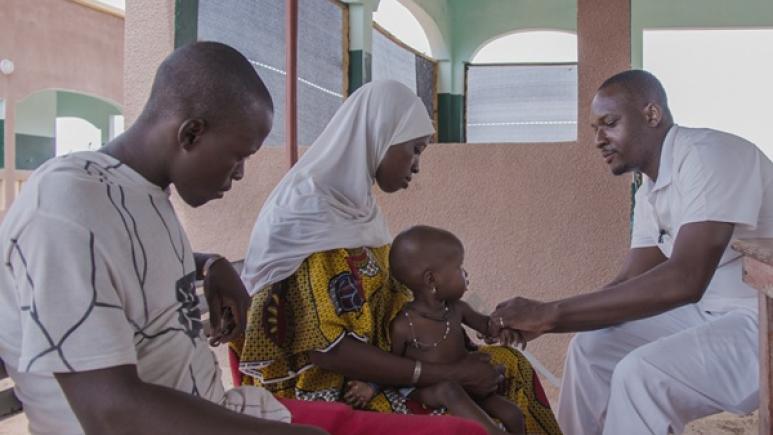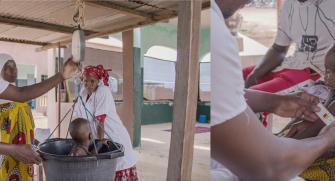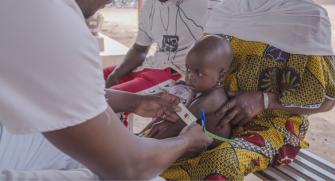Psychosocial stimulation, a booster for malnourished children and their families
In Mali, although being recommended in the national protocol for the management of acute malnutrition, psychosocial stimulation is not yet systematically integrated into nutritional care. Several constraints, such as limited time and resources among health staff and the lack of a standardized protocol detailing the specific actions to be undertaken, hamper its implementation.
This approach, which complements nutritional care and medical treatment for malnourished children, consists in offering psychosocial stimulation sessions for the main caregiver, usually the mother, and the child. Several studies have shown that early psychosocial stimulation of infants has beneficial effects in both the short and long term on the child's cognitive and social development, which is often compromised in cases of malnutrition.
The StimNut study sought to assess the feasibility and acceptability of a psychosocial stimulation intervention for children aged 6 to 23 months suffering from severe acute malnutrition (SAM). Inspired by an approach initially developed in Nepal by Action contre la Faim (ACF), this intervention was adapted to the Malian context with the active participation of families, health personnel and local decision-makers.
Promising results for children and families
A total of 149 psychosocial stimulation sessions were offered to 36 families, led by three trained and supervised psychosocial workers. Assessments carried out before and after the intervention, alongside observations and interviews with beneficiaries and healthcare staff, revealed significant improvements at various levels.
Enhanced well-being for caregivers
On an individual level, the mental health of caregivers has improved. The study showed a significant reduction in symptoms of perinatal depression in mothers, from 53% before the intervention to 28% afterwards. In addition, the well-being of caregivers improved, as did their confidence in their parenting skills. One mother shared:
“I'm happy today. The day I arrived at the health center, I was like a sick person, given that if a woman is happy, it's because her child is too (...) Even breathing was difficult for me the day I arrived at the health center, I was restless all the time. The sessions helped me to relax.”
Strengthened bonds between caregivers and their children
Positive changes in the caregiver-child relationship were observed in 83% of participants, marked by the development or reinforcement of more frequent and adapted care practices related to communicating with the child and showing affection. After the intervention, more caregivers expressed their pleasure at sharing daily activities with their children, such as bathing, mealtimes or playtime, as this 30-year-old mother testifies:
“I had no idea that the child had to play with his mommy. This child will be different from my other children because he'll have my affections. My other children don't even know I'm their mom. We don't play together. I had no idea”.
Positively improved family ties
The psychosocial intervention also fostered greater involvement of other family members, particularly fathers and grandmothers, in caring for children, creating a more supportive environment for their development. One nurse highlighted this shift:
“Since the dad started playing with him, talking to him and giving him little presents, the child is so interested in his daddy, really, I've enjoyed it a lot”.
Some mothers also reported passing on parenting knowledge and skills acquired or reinforced during the sessions to others in their community, including husbands/fathers, co-wives, sisters-in-law, neighbors, etc. Some even accompanied other women in their household in adopting new care practices, reinforcing their competencies.
An approach appreciated by healthcare staff
Healthcare staff also emphasized the benefits of this approach, which helped to strengthen relations between carers and attendants. Some of the caregivers' initially distrustful attitudes towards psychosocial workers, because they were proposing a new approach, evolved into positive attitudes, where psychosocial workers were perceived as allies.
“I said to myself that I would withdraw from the first session because I didn't believe in what they were saying (...). I had decided to withdraw from the first session because I didn't understand. It was only after the first and second sessions that I realized how important it was,” shared one caregiver.
Moreover, the intervention allowed to deconstruct certain prejudices that nursing staff might have had about mothers of children suffering from SAM. Within the health facilities, the results showed an improvement in the care of SAM children, with health workers acquiring knowledge in psychosocial stimulation, clinicians saving time thanks to more compliant caregivers and a better understanding of their children's illness, as well as better adherence to treatment.
Towards scaling up the StimNut intervention
The integration of this approach, combining psychosocial stimulation with nutritional care, has proved effective and accepted by caregivers, healthcare staff and psychosocial workers alike. On the strength of these promising results, the StimNut project is currently being rolled out on a larger scale within MSF-France, with prospects of extension into other contexts.
“To ensure successful implementation on a larger scale, we plan to develop a toolbox available to the field, which will enable the intervention to be replicated in other contexts,” explains Claire Bossard, Principal Investigator the study.
This approach will be scale up with the collaboration of all relevant actors in the field, so that it can best respond to patients’ needs and realities.
© Elijah Musinguzi










